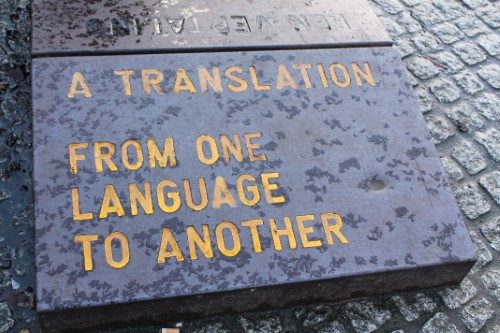 Today, we focus on using professional translators for voice messages.
Today, we focus on using professional translators for voice messages.
As we discussed in last week’s post, Choosing a Professional Talent for Your Voice Recordings, it is always a good idea to use professional Voice Artists for your organization’s voice messages, whether you are looking for a longer on hold message or for shorter Auto Attendant and IVR prompts. Just because technology makes creating your own recordings easier does not mean you will easily end up with a professional product.
The same principle holds true for when you need to translate a message for your global audience. It may seem like a simple matter to plug your needed text into Google Translate and use whatever gets spit out. But these sorts of translation software often perform only ‘word-for-word’ translation and make an absolute mess out of syntax, punctuation, and the ordering of words. Even if the message is ‘technically’ correct, the result will read as gibberish to native speakers.
Other intricacies can be lost if you simply plug text into a translation software and use what it gives you without further verification. For instance: Not all countries use “AM” and “PM” to denote times, and using such references will be meaningless to your intended audience. A service like Google Translate is not going to know how to amend those times to fit a specific country.
But a professional translator will.
To provide the best service possible, and subconsciously remind your global customer and partner base that you respect them and will put in the due diligence needed, it is vital to use a professional voice translation service. Ideally, you would use the same vendor for translation as you would for voice recordings, as this cuts down on errors and makes the process go both smoother and faster. Often, a vendor will have talent on hand who both translate and record, or who have worked together for a long period of time. This will result in quickly, skillfully assembled professional voice messages.
You may think that another smart shortcut would be to have someone in the office who speaks the needed language provide the translation services. Again, you run the risk of losing both accuracy and consistency. Non-professional translators are susceptible to using colloquialisms, slang, and localized forms of their language, just as English speakers develop variations depending on where they are from. And one thing you don’t need a customer or partner worrying about when trying to negotiate through an IVR system is a garbled message with exclusive phrasing. It is also important that the translator understand the specific regional requirements of a given language. Recordings in Spanish may need to be different depending on whether the call is originating from Spain or Latin America, and professional translators for voice messages will be proficient in the respective regional idiosyncrasies.
While the use of voice translation services ensures linguistic accuracy, it can still be very useful to have a native speaker on staff review the translations before recording. That can ensure that the finished voice messages meet the requirements of all the stakeholders for the finished project. Once you have developed trust with your vendor, you can begin to skip this step and know that the translation has been efficiently and expediently.
We at Marketing Messages are ready to help, and pardon the pun, we want to put our money where our mouth is. For the month of January, we are offering free translation for up to 400 words in one language for any company who has not yet contracted with us for translation services in that language. This includes our current customers who have employed Marketing Messages for translation in other languages. Just click here if you’re interested in this offer, and we’ll be in touch!

One response to “Using Professional Voice Translators for Your Voice Messages”